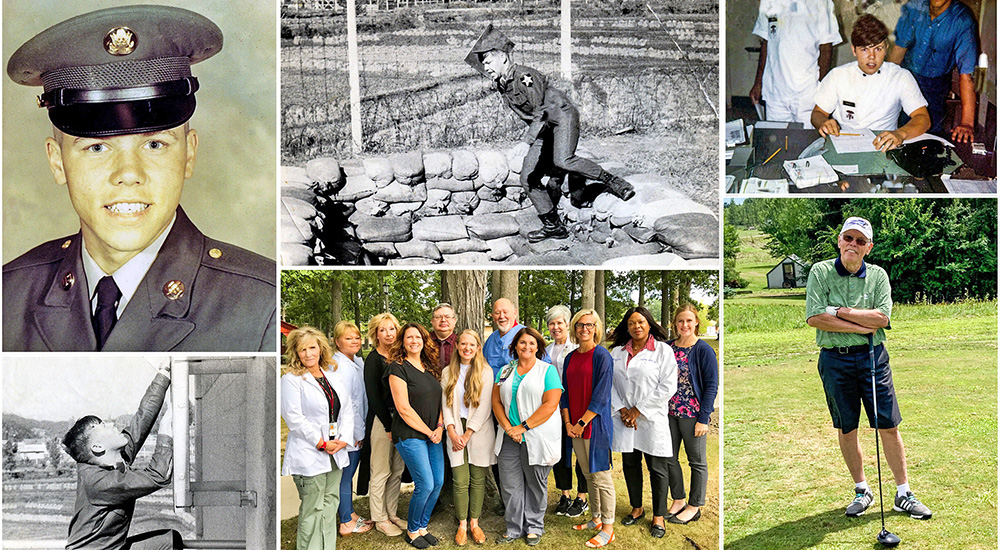Tony Davis joined the Army in 1967 as an advanced medical specialist to care for soldiers during the Vietnam War. He decided to join the service to make a difference. Instead of being drafted, he willingly joined to have some control of his future.
Davis served as a clinical specialist and an occupational therapy specialist at Fort Sam Houston in San Antonio and Valley Forge General Hospital in Phoenixville, Pennsylvania. In the demilitarized zone of Korea, he worked in the emergency room assisting mass casualties. He also trained the Korean Army attached to the U.S. Army for emergency medical services in-country and those who were sent to Vietnam.
Davis honorably separated from the Army in 1970 to purse a career in academics. He graduated from the College of St Joseph with a bachelor’s degree in liberal studies with emphasis in psychology. He also obtained a master’s degree in educational psychology and school counseling.
“I got into academics, counseling and education, and that became my life’s passion,” he said. Davis spent his life dedicated to education and human services, holding multiple positions with multiple universities, and retired after 40 years of working in education and human services.
Diagnosed with cancer in 2016
In 2016, Davis was diagnosed with cancer and, through his academic connections, was given an opportunity to participate in an 18-month clinical trial with Bristol Myers’s Squibb in Tucson, Arizona.
“Up to this point in my life, I had never used Veteran benefits, but I walked into the Office of Veterans Services to inquire about what I might be eligible for in terms of burial benefits. I encountered a terrific young man who got me started with health care, disability benefits and much more,” Davis said.
Davis was then transferred back home and started receiving care at Northern Indiana VA.
In 2023, Davis was diagnosed with Parkinson’s disease, an advanced disorder that affects the nervous system and parts of the body controlled by nerves. “I was formally diagnosed by VA on Valentine’s Day 2023, but we have known since late 2021,” he added.
Qualified for Home Based Primary Care
After some in-depth discussion with his health care team, together they decided that Davis would qualify for and benefit from the Home Based Primary Care (HBPC) program.
HBPC delivers quality primary health care to eligible Veterans with complex co-morbid chronic diseases. HBPC staff make visits to Veteran’s homes to meet their primary care needs.
HBPC uses a comprehensive team approach. The team consists of a primary care provider, registered nurse, registered dietitian, licensed clinical social worker, rehabilitation therapist, clinical pharmacist and psychologist.
“It has always been an honor to work with our Veterans, but to work with them in the comfort of their homes, to get to know them and their families on a regular basis, is so much more fulfilling. We have the privilege of assisting them to meet their goals, to stay healthy and safe in their own homes for as long as possible,” said Jo Barkley, HBPC nurse case manager.
“Team of angels”
Davis refers to his team as his angels. With the support of his wife Sally and the HBPC team, he has hit a golf ball for the first time in 11 years. He has also started painting, drawing, gardening and making videos for his friends and family.
The HBPC team visits Davis on a frequent basis. The team works together with the primary focus of assisting him with his specific needs to remain independent and safe while living at home.
“My dietitian comes to see me every six months. I follow her diet plans, and I have been able to gain weight and muscle. I went from 146 pounds to 152 pounds with the help of her plan. My occupational therapist (OT) has also been a key part of my growth,” he said.
Davis and his OT have been working hard with weights and exercises to build muscle. Together, they attend Performance Golf and the gym to track his golf swing progress.
“I’m ecstatic. I have been diagnosed with Parkinson and I’m going to play golf this summer. We are going to do this,” he said.
Davis is also visited by a social worker who assists Veterans with their social, financial, and emotional support needs.
“My social worker is incredible. She assists me with important after-life decisions, but also gives ideas and support to have a great life before you get to that. There is nothing I couldn’t tell her,” he added.
Davis describes HBPC as spokes of a wheel that all work together with the Veteran being in the middle. “If you’re going to buy into the program, buy into the whole thing. You need all the spokes to help you live your highest quality of life.”
Topics in this story
More Stories
Bob Jesse Award celebrates the achievements of a VA employee and a team or department that exemplifies innovative practices within VA.
The Medical Foster Home program offers Veterans an alternative to nursing homes.
Watch the Under Secretary for Health and a panel of experts discuss VA Health Connect tele-emergency care.







Need to include how to get these services
My understanding, support and prayers are with you and your family. Believing that all things can work favorably for you, and wishing that you will be granted a recovery that you deserve. ?
Fellow US Army Vet/ Believer
Excellent article.